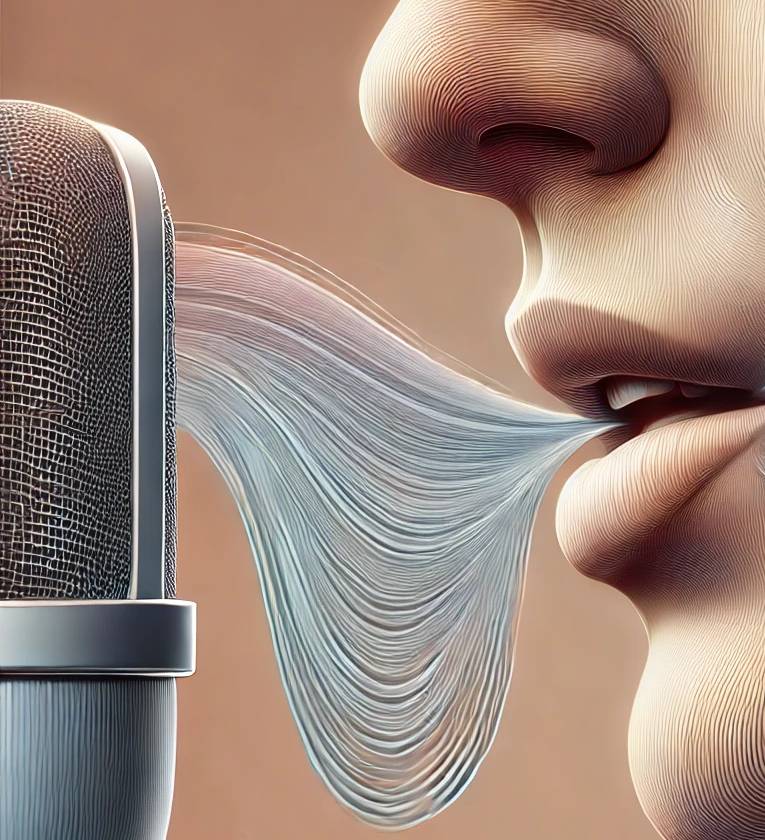 Sure, content is crucial when you’re a podcaster, but how that content is delivered can make a world of difference: Your voice can be your most powerful tool. Improving your vocal skills can help you sound more engaging, clear, and confident, enhancing the overall experience for your listeners. Keep in mind that as you work to improve your vocal skills, listeners want authenticity, so make sure they’re still hearing “your voice” sounding smoother and more professional.
Sure, content is crucial when you’re a podcaster, but how that content is delivered can make a world of difference: Your voice can be your most powerful tool. Improving your vocal skills can help you sound more engaging, clear, and confident, enhancing the overall experience for your listeners. Keep in mind that as you work to improve your vocal skills, listeners want authenticity, so make sure they’re still hearing “your voice” sounding smoother and more professional.
If you’re not happy with how you sound, we’re here to help. With a little effort and practice, you can strengthen your vocal performance and make your voice a key asset to your show.
Why Vocal Skills Matter in Podcasting
Your voice is the vehicle for your message. A well-trained voice can convey emotions, maintain clarity, and keep your listeners engaged longer. If your voice is monotone, breathy, or difficult to understand, your audience might lose interest or struggle to follow your content. Strong vocal delivery can transform a good podcast into a great one by keeping the audience entertained and engaged from start to finish.
Vocal Exercises to Boost Your Performance
To improve your vocal delivery, practicing vocal exercises is essential. These exercises will help you control your breathing, improve your vocal range, and make your voice more pleasant to listen to. Here are a few exercises to incorporate into your daily routine:
1. Breathing Exercises
Proper breath control is fundamental for good vocal performance. Start by practicing diaphragmatic breathing — or belly breathing — where your stomach expands as you inhale and contracts as you exhale. Here’s a simple exercise to try:
- Sit or stand upright.
- Take a slow, deep breath through your nose, filling your lungs fully.
- Hold your breath for a few seconds, then slowly release it through your mouth.
- Repeat this several times, focusing on steady, controlled breathing.
This helps regulate your breath while speaking, ensuring that you don’t run out of air mid-sentence and can project your voice clearly.
2. Lip Trills
Lip trills are an excellent way to warm up your vocal cords and improve vocal control. Here’s how to do it:
- Relax your lips and blow air through them, causing them to vibrate (or trill) like a gentle motor sound.
- Sustain the trill while sliding up and down your vocal range, almost like humming with a buzzing lip sound.
- This exercise helps with vocal flexibility, making it easier to modulate your pitch while speaking.
3. Tongue Twisters
Tongue twisters are great for improving diction and clarity. Try repeating classic tongue twisters like “She sells seashells by the seashore” or “Peter Piper picked a peck of pickled peppers.” Start slowly, then gradually increase your speed while maintaining clear enunciation. Practicing tongue twisters will help you articulate words better, especially during fast-paced moments of your podcast.
4. Humming
Humming warms up your vocal cords gently and helps you improve resonance. Begin by humming at a comfortable pitch and gradually move up and down your range. This exercise will help make your voice more vibrant.
Filters and Effects to Enhance Your Voice
In addition to vocal exercises, technology can further improve how your voice sounds in a podcast. Many podcast recording software programs allow you to use filters and effects to enhance vocal quality. Here are a few examples:
- Noise Reduction Filters: These filters help eliminate background noise, allowing your voice to come through cleanly without distractions.
- Equalization (EQ): EQ filters allow you to adjust the bass, mids, and treble in your voice. Boosting certain frequencies can make your voice sound fuller and warmer.
- Compressor: This effect helps balance the volume of your voice, ensuring that quieter moments are amplified and louder moments are reduced, resulting in a more consistent sound throughout the episode.
- De-Esser: A de-esser reduces harsh “s” sounds that can be unpleasant to the listener’s ears. It smooths out the audio and makes your voice sound more polished.
Again, keep in mind that your audiences want to hear you speak, not some tinny, automated, mechanical AI voice, so don’t overdo it!
Improving your vocal skills can greatly enhance the quality of your podcast. By incorporating vocal exercises into your routine and using audio filters effectively, you can develop a voice that is clearer, more dynamic and more engaging for your audience. Over time, these small improvements will lead to a more professional-sounding podcast and a better experience for your listeners.
Find out about media mastering with Blubrry’s partner, Auphonic! Just starting your podcast? Make sure you explore Blubrry’s top-tier hosting options to grow and monetize your show.





